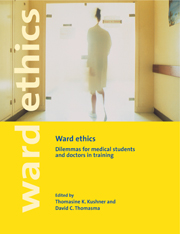Book contents
- Frontmatter
- Contents
- Acknowledgments
- List of contributors
- Prologue. Breaking the silence
- Letter from a young doctor
- Part I On caring for patients
- Section 1 Performing procedures
- 1 The responsibility of informing
- 2 Treating despite discomfort and self-doubt
- 3 Blaming the patient
- 4 Breaking the code: is a promise always a promise?
- 5 The newly dead
- 6 Asking for help: who's listening?
- Section 2 Problems in truth-telling
- Section 3 Setting boundaries
- Part II On becoming a “team player”: searching for esprit de corps and conflicts of socialization
- Section 5 Argot, jargon, and questionable humor: assuming the mantle at the patient's expense
- Section 6 Making waves: questioning authority and the status quo
- Section 7 Perceiving misconduct and whistle-blowing: observing peers or superiors commit an act deemed unethical
- Epilogue: Using this book
- Glossary
- Index
1 - The responsibility of informing
Published online by Cambridge University Press: 05 February 2015
- Frontmatter
- Contents
- Acknowledgments
- List of contributors
- Prologue. Breaking the silence
- Letter from a young doctor
- Part I On caring for patients
- Section 1 Performing procedures
- 1 The responsibility of informing
- 2 Treating despite discomfort and self-doubt
- 3 Blaming the patient
- 4 Breaking the code: is a promise always a promise?
- 5 The newly dead
- 6 Asking for help: who's listening?
- Section 2 Problems in truth-telling
- Section 3 Setting boundaries
- Part II On becoming a “team player”: searching for esprit de corps and conflicts of socialization
- Section 5 Argot, jargon, and questionable humor: assuming the mantle at the patient's expense
- Section 6 Making waves: questioning authority and the status quo
- Section 7 Perceiving misconduct and whistle-blowing: observing peers or superiors commit an act deemed unethical
- Epilogue: Using this book
- Glossary
- Index
Summary
Implications of physician experience
CASE
“First time”
I was a senior fellow under the supervision of Dr. M when a situation arose regarding informed consent. Mr. W had been hospitalized 4 days earlier and was increasingly concerned that Dr. M's search to find the reason for his mysterious set of symptoms, including three consultations with colleagues, had been unsuccessful. He was convinced he had undergone almost every diagnostic procedure imaginable.
Dr. M agreed with a recommendation that a liver biopsy be performed. She carefully explained all the reasons for doing the procedure, emphasized the potentially helpful information it could produce, and described the possible complications. She also discussed what few alternatives were available and the relative advantages and disadvantages of each one, but she concluded by noting they were unlikely to produce very useful information.
Having confidence in Dr. M's clinical judgment, Mr. W stated he was willing to have the liver biopsy. At that point, Dr. M mentioned that, as her senior fellow, she would like me to perform the procedure. She informed Mr. W that she would be present during the liver biopsy, and he gave consent.
- Type
- Chapter
- Information
- Ward EthicsDilemmas for Medical Students and Doctors in Training, pp. 18 - 32Publisher: Cambridge University PressPrint publication year: 2001



